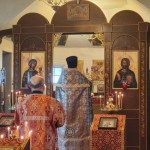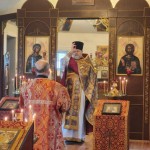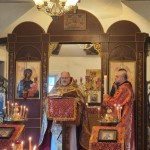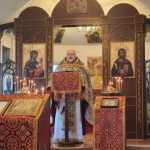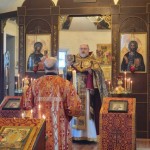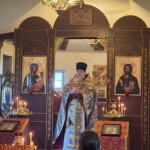On December 18, on the 27th Sunday after Pentecost, feast of Venerable Sabbas the Sanctified, St. George Parish family gathered for a beautiful celebration. Our Rector, Archpriest Igor Tarasov headed the Divine Liturgy in our temple. After the Gospel lesson he preached the following homily:
“Dear brothers and sisters in Christ! Today we read the Gospel about the healing of ten lepers (Lk. 17, 12-19). First of all, that story is supposed to teach us to be grateful: grateful to God for His blessings and grateful to other people for their good deeds towards us. But today we will also speak about people being together as a group or as a community, and also about us acting alone”.
“Today we celebrate feast of Venerable Father Sabbas the Sanctified. He lived in the 4th and 5th centuries, and all his life he was a monk. Being a 8-year-old boy, Sabbas was left for some time in a monastery in Alexandria by his parents. After 9 years they came to take him back home, he refused and became a monk at his early age of 17. Later St. Sabbas moved to the Holy Land and lived in the desert monasteries near the Jordan River. He became a founder of several monastic communities, especially of a large monastery bearing his name – the Lavra of St. Sabbas. He is called the Sanctified because he was a priest while most of the monks of those times did not receive the holy orders. St. Sabbas was the author of the liturgical and monastic rules known as the Jerusalem statute. And the specific of his monastic rule was that the monks live as a community, live together in a so-called koinobia, in common living, a living as a community. We should recall that first Christian monks usually started their desert life alone. However, later many of them gathered together or some community of disciples gathered around some elder who started alone. Thus, the community living of the monks became more spread, and St. Sabbas was one of the founders of such type of monastic life”.
“As we can see, dear brothers and sisters, people join together to make their life or their efforts easier. We join into different kinds of groups, social communities, business partnerships, political parties, religious congregations, and that help us. The philosophers say that human being is a “social animal”. Therefore, it was natural and useful for the monks to prefer living together in the monasteries, as St. Sabbas organized, and not alone. Praying together, holding services together and supporting each other in many ways – that is helpful for the monks. In the similar way, we, as Orthodox Christians, get together in our parish communities. We gather for the services, especially for the Divine Liturgy where we have the greatest celebration of the communion with God, the Holy Eucharist. When we pray, we say “Let us pray to the Lord”, not “Let me pray”. We say “Blessed be our God”, not “My God”. And, finally, the Lord taught us to pray “Our Father”, not “My Father”. The whole Orthodox Church is such a community keeping us together as the Body of Christ”.
“Therefore, dear brothers and sisters, it is good to belong to a community, especially to such a holy community as the Holy Orthodox Church. However, not every group of people is helpful and beneficial. There are the gangs of criminals, the hordes of villains or heretical sects. It is better for a man not to join them. The Book of Psalms starts with the impressive words, “Blessed is the man who walks not in the council of the ungodly” (Ps. 1, 1). If there is such a council, such a group, it is better to be alone than to join them”.
“In today’s Gospel the lepers also joined together in a group. There were ten of them staying together. As we read, they asked Jesus to help them. You may say that it was some kind of communal prayer, a resemblance of a church. But, in fact, the lepers joined for convenience, not for a high cause. They were comrades in misfortune: due to their illness, the lepers were outcasts of the society and could not communicate with other people. So, they joined in such groups. And as we see, that group had no real unity. When they became healed, they no longer stuck together: only one came back to Jesus to give thanks. Thus, even if the other nine were still together, the one separated to do the right thing. He was alone but he did it and he did not walk in the council of the ungodly”.
“Therefore, dear brothers and sisters, we have to learn to be wise and selective in our choices. We have to understand that it is better to be in a community, in a right gathering to achieve beneficial results. We have to stay in the Church to be saved. We have to belong to a parish to attend the services and receive Sacraments together, to listen to the Word of God and to the sermons of the priests. But when we have danger or temptation to join a group of people whose goals are ungodly, or sinful, or not beneficial for our well-being – then we have to avoid such a group, then we better stay alone. Many holy men and women preferred to be alone than to belong to some bad company, a wrong crowd or a community of sinners. These days of December we often commemorate the Old Testament Prophets. Very often they were alone in their cry against the iniquities of the people while most of the society lived in sin. Nowadays many people around us live ungodly, forgetting about God. But we should not join them. There is a popular saying that if everyone else will decide to throw themselves from the bridge, will we follow? We better be in a minority, better even be alone than to be with them. And in today’s Gospel one of the healed lepers was alone in his gratefulness to the Lord, in his God-pleasing attitude while nine others were joined in their ungratefulness”.
“Dear brothers and sisters! Let us be wise and discerning what is good and beneficial for our souls and what is bad and dangerous. Let us remember that we are being saved in the Holy Church, in a sanctified gathering, but we are saved individually. Salvation is our own personal agenda. If we see that people around us do not care for salvation, we better avoid them and take care of our souls. But if we see the true Church of God, the true Body of Christ where we may be saved, we have to be there. Thus, like those ten lepers, let us be together for acquiring the divine grace, to receive the healing of the souls, but like one of them, let us be alone in our personal journey for salvation. And may the all-merciful Lord by the prayers of Venerable Sabbas praise our efforts and bless our ways, both common and individual!”
During the Litany of Fervent Supplication the Rector had a petition for the suffering country of Ukraine and its people. He also added a commemoration of the “suffering Ukrainian land” at the Great Entrance.
The choir nicely performed hymns dedicated to the commemorated Venerable Sabbas the Sanctified during preparation for Holy Communion.
After the dismissal of the Liturgy the Rector greeted our Sacristan and altar server, Andrew Malyshev on the occasion of his past name day. Traditional Polychronion (“Mnogaia leta!”) was proclaimed and the Theotokian prosphora given. Then Fr. Igor handed the presents from St. Nicholas to the parish children.

